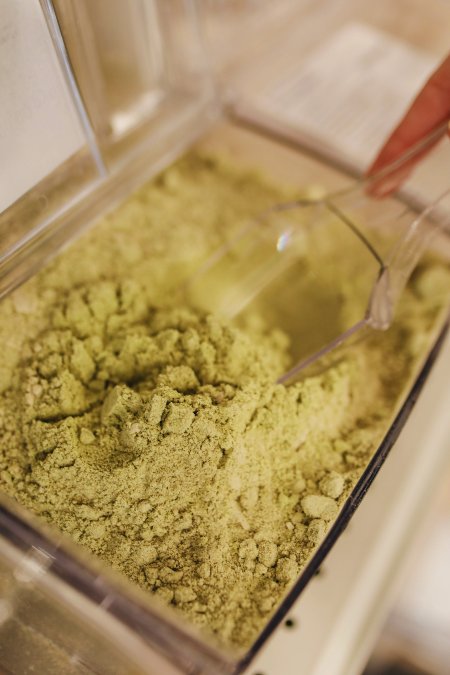
Matcha is quite different from, say, green or black tea, even though it’s made from the leaves of the same tea plant – Camellia Sinensis. Because of the way matcha is grown and processed, it comes in the form of powder. It stands out because of its appearance and way of use. Naturally, its shelf life differs from the shelf life of regular tea.
In this post, you will find out whether matcha goes bad and how long it lasts unopened and after opening. Apart from learning whether it expires, in this guide, you will also find out how to store matcha powder, and whether keeping it in the fridge or freezer would make it last longer.
Without further ado, let’s dive in.
Does matcha Expire?
If stored properly matcha doesn’t expire or go bad in a way that would make it unsafe to consume. It usually comes with a “Best By” or a “Best before” date printed on its packaging which indicates quality, not safety.
After this date, matcha would’ve already lost its pleasant umami taste, rich flavor and aroma, and a significant portion of its beneficial compounds.
As times go by, matcha also develops off-flavors and may even become unbearably bitter, which would make it undrinkable.
The beneficial substances found in matcha, such as the natural antioxidants catechins, start to degrade with time.
So it’s safe to say, that with time matcha powder loses its beneficial potential.
To preserve the catechin content for longer, you should keep matcha away from humidity and high temperatures. By doing so you will also slow down the decrease of matcha’s caffeine levels.
If you want to find out more about matcha and whether it’s better than coffee, check out their comprehensive side-by-side comparison by clicking here.

Photo by Polina Tankilevitch from Pexels
When it comes to culinary grade matcha, you might not be able to notice such a great difference between the looks of a fresh and an old product, but you will definitely sense the difference in taste.
How long does matcha last?
If unopened, matcha lasts for 6 months. If kept in the freezer it may remain fresh for up to 12 months. Once opened, if stored away from heat, light, and moisture, ceremonial grade matcha should be consumed within 4 to 5 weeks. If properly stored, a packet of culinary grade matcha may last for 6 to 7 weeks after opening.
It’s safe to consume matcha after this period, but it may taste a bit off – not vibrant, stale, or even bitter.
Proper Storage of Matcha Powder – Tips
As I already mentioned, the storage conditions are of great importance too.
For example, matcha’s freshness and its characteristics related to high quality will last longer if you keep the powder at lower temperatures.
Not only the flavor, but also the antioxidant activity of matcha will diminish faster if the green powder is stored at a higher temperature.
That’s why many people store their unopened tins of matcha in the freezer – to extend its freshness for longer.
Once you unseal the package, I wouldn’t recommend freezing and thawing matcha each time you want to use it. This may lead to excessive condensation which will damage the product.
Some people who live in a warmer climate, keep their opened tins of ceremonial matcha in the fridge.
Nevertheless, you shouldn’t take it in and out of the refrigerator for too long too often, as temperature variations may also lead to degradation of matcha’s key substances and volatile compounds.
Furthermore, matcha picks up smells quite easily, and in case it’s not well-sealed, it may get the odors of other refrigerated foods. Some matcha enthusiasts have a dedicated refrigerator for their matcha, but this is quite an exception among matcha consumers. To prevent odor contamination in the fridge, you can place your matcha tin in an airtight ziploc bag for extra protection.
You should also make sure that you keep matcha in an airtight container, which limits its exposure to oxygen as much as possible. Matcha powder should also be kept away from moisture and light.
Light speeds up the processes that lead to flavor deterioration, loss of color, and degradation of beneficial substances.
In case you don’t live somewhere hot, my advice for you would be to keep matcha in an airtight opaque container in the kitchen pantry once it’s opened.
If it’s still unopened and you aren’t to use it in the following 6 months, store it in the freezer.
If you are to unseal the package within a couple of weeks, freezing won’t make a great difference in the shelf life of your matcha powder.
Ways to use expired matcha
If you feel like your matcha isn’t good enough for having it pure, or in other words, it’s freshness has expired, there are other ways to put it to use.
Of course, you can always use matcha that doesn’t taste as good on its own in a matcha latte or a smoothie. You can find a few matcha recipes here on The Woke Lark:
If you feel like your matcha powder won’t taste good in lattes, frappes or smoothies, there are other ways to put it to use.
Here are some ideas on how to use expired matcha:
- For cooking. There are many matcha recipes that you can find online – from cookies to matcha cakes and ice creams. Even if expired, matcha still contains some beneficial substances in it. Furthermore, cooking with matcha always results in something that’s not only delicious but also cool-looking. So if you make green chocolate chip cookies your guests (or Instagram followers) will definitely be intrigued by the appearance of your homemade treat.
Photo by Buenosia Carol from Pexels
- Use it on your skin. Occasionally, I’d make a face mask with matcha by mixing a teaspoon of the green powder with a teaspoon of coconut oil. After applying it and washing it off with lukewarm water, my skin always feels great – soft and well-moisturized.
- Enrich soil or compost pile. Even if expired, matcha still contains some beneficial nutrients for plants. It may also speed up the decomposition of the other ingredients in your compost.
Over to you
I hope that you found this post useful and that you learned something new about matcha.
Matcha’s freshness doesn’t last for long, especially once you open it. Nevertheless, even if expired, it’s still safe to consume, especially if you’ve stored it properly.
Leave me a comment below if you have any questions.

